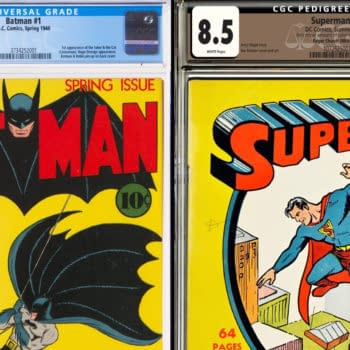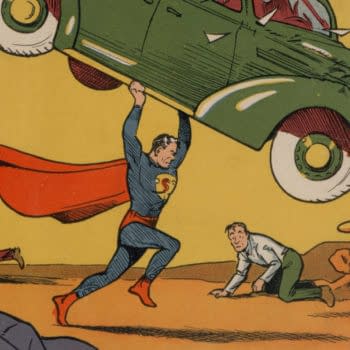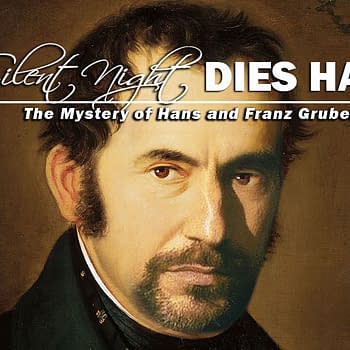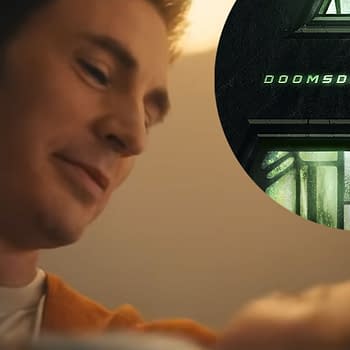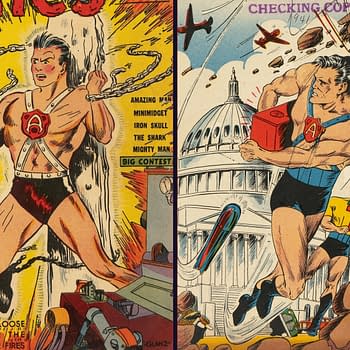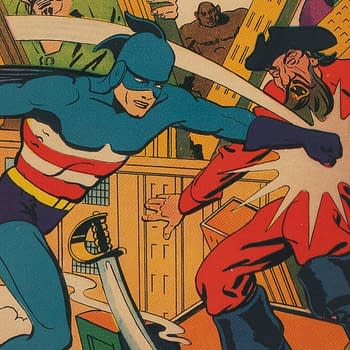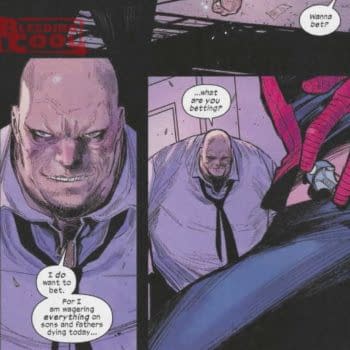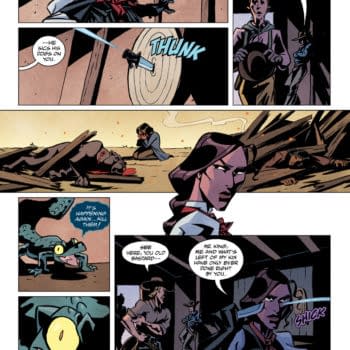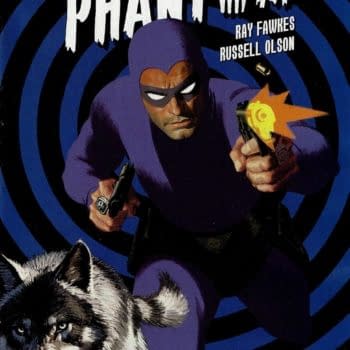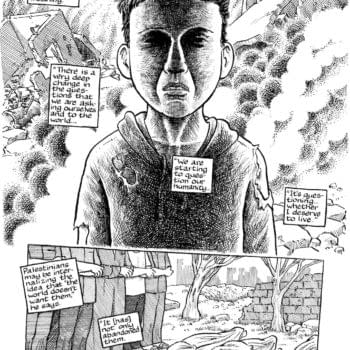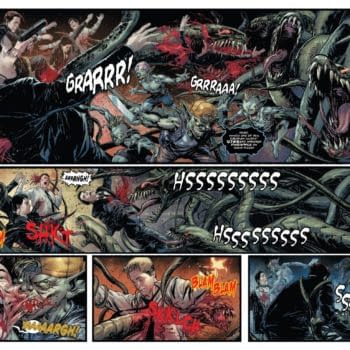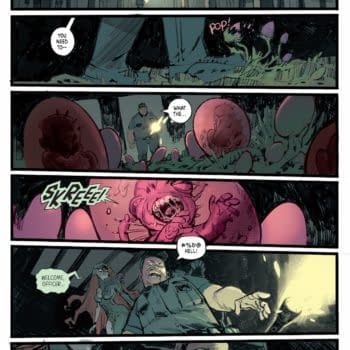Posted in: Comics, Recent Updates | Tagged: captain america, Comics, entertainment, joe quesada, marvel, nazis, nick spencer, punch, punching nazis, richard spencer
How Joe Quesada Killed Nick Spencer's Dreams, And Other Tales From The Spencer Spotlight Panel

The discussion began by going over Spencer's background, being born in Ohio to encouraging parents, and getting comics has a kid.
"A lot of people in my generation have a thing where they grow up reading superhero comics," he said, speaking about how as he got older he stopped reading them. "But then you're reading Preacher and Sandman at that point," he said.
When the topic shifted to the Superior Foes of Spider-Man, he was asked about a recent tweet when he said he'd pitched a version of that book to Joe Quesada when he was 19.
Spencer expounded on the story, as he said he was a big fan of Kevin Smith who was close to Jimmy Palmiotti and Joe Q. Due to the connection, Spencer managed to get a few pitches to Joe. "He was super polite and taking a 19 year old kid's pitches … it was a huge deal for me then. Three months later, I decided to go to college and be a responsible adult."
Joe Quesada KILLED his dreams… temporarily.
Spencer was asked about the comparison he gets between Superior Foes and Hawkeye, which show a different side of their characters' lives.
"The Hawkeye comparison is super flattering," he said. "Having those kind of comparisons is nuts. My book is filled with dick-and-fart jokes, it's just not on that level! But we're super proud of it.
"When I sat down to do the book, I didn't brush up on my Hawkeye. It wasn't a conscious thing. I think Hawkeye helped make the book happen."
Spencer said he's a big Superman fan, but Spider-Man was always right there. He then talked about his love for Cyclops, and how much flak everyone gets for liking characters like him.
Back to college, Nick said he graduated in political science and he became involved in politics. "Like any person, you're struck by the federal developments," he said, but that as he got older he began focusing on local politics.
"I owned a bar for a bit, and eventually I had this thing around my late 20's, 'the politics thing didn't work out, you're not going to be owning bars for the next 20 years. So what's next?'
"Why don't I try out the writing stuff?"
How long did it take to get his first pitch accepted? "Two years." During that time he moved to New York and took comic classes from former Marvel editor Andy Schmidt in his Comics Experience course.
The topic of how Morning Glories has affected his approach to Work for Hire came up.
"You don't have to say yes to everything you're offered," he said. "You've got to establish relationships with editors." His plan is to have two creator-owned books going at the once, maybe three if he gets greedy.
Next, Morning Glories was brought up in earnest, mentioning myriad aspects that comprise the series.
"It's not exactly a thing where I'm going to dick you around for 94 issues then tell you this stuff in the last six. There are sign posts that show where it's going. Even in the first arc, we've got a lot of answers to mysteries that were presented in there."
"Morning Glories is a fun series in that, I think we're pretty good at getting people to care about these characters and what they're going through… but we have our pretty absurd moments, and certainly some of the relationships are a little exagerated."
He talked about the influence of 90's teen slasher fix, saying that he worked at a movie theater when Scream 2 came out. "That opening scene with Jada Pinkett Smith, man."
Whether he'd do a comedy series, he said Superior Foes is the closest he'll get. "It's fun to be stretching those muscles again."
Speaking of personal influences, he mentioned Joss Whedon, Keith Giffen, and Brian Bendis.He said that Bendis changed the game as far as dialoguing books.
Next he spoke about his collaborations with Joe Eisma, where they met at Bendis's message boards.
"He is a machine," Spencer said. "It's very nice to have. He's a very dedicated guy. He cares very passionately about the book's success and the story we tell."
When asked about the differences between Season 1 and Season 2, Spencer said, "Issue 29 was amazing to write… We go back to the central premise of the book.
"I wasn't sure at the time when we started doing [the Woodrun] story," Spencer said. "Ultimately the thing we decided to do was accelerate it. Sometimes I wish we did one more arc before it, but now that it's through… I'm really proud of it."
Spencer doesn't work from a master document, and for a comic like Morning Glories that's pretty frickin' mindblowing.
"Right now, on [current storyline] 'Demerits'… every issue you've seen more of the cast and everything's coming to a head," Spencer said, "But I'm really interested in getting back to the character-centric stuff."
Talks shifted to Bedlam and new artist Ryan Browne.
"Starting Bedlam, I wanted to challenge myself," Spencer said. "You don't want to get boxed in writing a certain kind of character or book. With Bedlam I wanted to do something more old-fashioned, something that's a procedural.
"What I've noticed as I get into the second arc, my habits creep in even more. There are definitely some long-term mysteries in the book."
The flashbacks flesh out the main character of Bedlam, who was formerly a Joker-esque supervillain with the dial turned to 11.
Fans started asking questions. One asked if the Truants would be going away.
"They're a part of the book," Spencer said. "The ones that are still alive."
The next fan asked about Hunter's ability with time, and if he can give more details about it. Spencer said he was sort of inspired by Hurley from Lost, who also had an ability with numbers.
The reference to Lost came up, but Spencer said he's fine with it. "It was such a huge influence on me," Spencer said. "Maybe I'd be more ashamed if the creators haven't been so nice."
A question came up about how much of the story is fluid and if character deaths are planned in advance, specifically mentioning how he debated killing Hunter over Zoe earlier in the series.
"I can change my mind all the times if I can figure out a way to make it work," Spencer said. "It can be tricky to explain that. I know where the book is going and why things are how they are, but I'm still writing it."
Zoe might not be showing up again, but there are mysteries surrounding her that need to be solved.
The next question is about his influences and whether what he's currently reading seeps into his work.
Another fan asked how he manages fan expectations.
"Lost has been off the air for how long? A few years? And people are still talking about [their disappointment]. No matter what you give people, in the end people become wedded to their own ideas or their own theory. When it's not the Egyptian God, they get mad.
"It's a weird, kind of back-handed comment when they say 'your ending sucks.'"
Asked about his dislike for Batman but writing Bedlam, he said "There's a difference between writing a Batman story and telling a Joker story. Joker's awesome."
The last question was about last names of the characters of Morning Glories, Spencer said "you'll get names."
With that, the panel closed.




